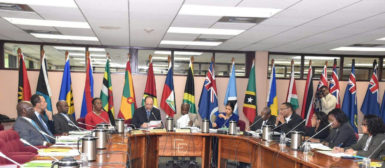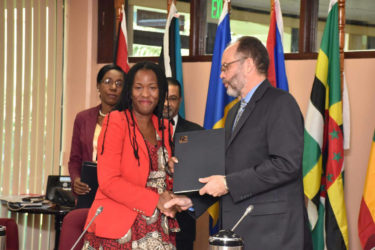A two-year Memorandum of Understanding (MoU) outlining areas of support to drive the achievement of gender equality goals was signed yesterday by the Caricom Secretariat and the United Nations Entity for Gender Equality and the Empowerment of Women (UN Women).
The signing of the MoU formed part of the agenda of the opening of the 39th Council of Ministers meeting, held at the Caricom Secretariat yesterday.
“I would like to thank the United Nations Entity for Gender Equality and the Empowerment of Women—UN Women—for coming forward to assist the Secretariat and the community to strengthen the support for issues related to gender. It is particularly significant for us given that our challenges with financial resources have hampered us in our quest to fulfil a number of crucial positions, including the area of gender,” Caricom Secretary-General Ambassador Irwin LaRocque stated.


Tonni Ann Brodber, representing the UN Women at the signing ceremony yesterday, provided an overview of the MoU, which she stated will focus on three areas for collaboration.
The first is to enhance Caribbean-wide data, statistics and analysis on the implementation of the gender dimensions of the Sustainable Development Goals (SDGs) and the Small Island Developing States (SIDS) Accelerated Modalities of Action (SAMOA) pathway.
The second is to ensure there is a Caricom-wide voice in the processes shaping sustainable development at the national level in relation to gender equality.
The third is to deepen the capacities of Caricom’s member states to implement international, regional and national commitments, such as the Convention on the Elimination of All Forms of Discrimination Against Women.
“One of the things that has been becoming more and more clear, especially over 2016, is that gender inequality is a cost that Caribbean small island developing states as well as states that are on the continent cannot afford,” Brodber stated in her address to the audience.
“The cost, for example, of one of the most egregious forms of gender equalities—gender- based violence—is $3 trillion to the global economy. When we look at the costs of the investigations in violence, the health aspects of violence and the fact that in the Caribbean, what we have been seeing is that 30% to 50% of our murders right now are intimate partner violence related,” she added.
LaRocque related that included on the agenda is focus on modelling legislation and region-specific tools to identify the root causes of gender based violence in order to drive behaviour change and ensure “strong, evidence-based advocacy.”
Meanwhile, LaRocque told the gathering that 2017 was going to be a crucial year for Caricom’s reform process, given that it was the mid-point of its five-year (2015-2019) strategic plan.
He noted that the community was still grappling with such issues as low growth, correspondent banking challenges, climate change, crime and security and restrictions on access to concessional development financing.
Calling for the strengthening and deepening of the community’s integration process, he said it was the “best option” to ensuring that the community could withstand these challenges.




